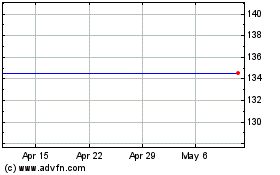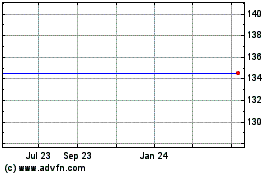SpaceX Leads Probe Into Blast
September 08 2016 - 9:10PM
Dow Jones News
The investigation of a Falcon 9 rocket that exploded during
ground tests last week highlights the primacy of industry
self-regulation when commercial space operations run into
trouble.
Federal authorities aren't leading the probe into what caused
the fiery blast, which destroyed the roughly 220-foot unmanned
rocket and the commercial telecommunications satellite sitting on
top of it. Current law reserves that authority for the booster's
manufacturer, in this case billionaire entrepreneur Elon Musk's
closely held Space Exploration Technologies Corp., or SpaceX.
Various government experts, including officials from the Air
Force, Federal Aviation Administration and National Aeronautics and
Space Administration, are members of a roughly 20-member
investigative team, according to industry and government officials.
So are a number of independent industry experts, though none of the
participants' names or the number of representatives from each
entity have been announced.
But SpaceX's role is paramount, these officials said, and only
representatives from the company and FAA have a formal vote,
according to one of these people. The final report is subject to
FAA approval, on which future launch licenses depend.
Despite damage to the launchpad at Florida's Cape Canaveral Air
Force Station, last Thursday's high-profile accident didn't involve
a government payload or mission. That puts it outside the direct
purview of federal investigators and into this novel category of
company-led probes.
The investigation is led by Hans Koenigsmann, SpaceX's vice
president for flight reliability, according to the person, with
hundreds of other company employees helping scour data and
performing analyses to get to the root cause of the blast.
The FAA has a single vote, this person said, with SpaceX having
all remaining votes.
The structure and operation of the investigative group,
according to the officials, reflect strict legislative restrictions
on the role of federal agencies in accidents involving purely
commercial space ventures.
Congress approved legislation last year reiterating that the
FAA, which licenses all space launches, should take a largely
hands-off approach when it comes to regulating the burgeoning
commercial space industry, particularly fledgling space-tourism
ventures. Lawmakers mandated the agency to focus primarily on
protecting people and property on the ground, rather than ensuring
the safety of passengers or crews during flights.
The vagaries of the blast itself have contributed to limited
federal authority, since the event is officially classified by the
FAA as a "mishap" because there were no injuries or damage to
surrounding property.
SpaceX last week announced formation of the investigative team
and participation of the federal agencies, but didn't elaborate on
how the members would work together. At the time, it pledged
"regular updates on our progress and findings, to the fullest
extent we can share publicly."
The FAA on Thursday suggested its role was likely to be more
advisory than actively shaping the investigation. "Much like
aviation accident investigations, often the FAA is called up for
its expertise on specific technical and regulatory matters," the
agency said.
NASA is relying on SpaceX and the Falcon 9 to continue sending
cargo capsules to the international space station, and to start
ferrying astronauts there later this decade. The agency has awarded
more than $3.1 billion worth of contracts to SpaceX for developing
vehicles and providing crew transportation. But NASA officials also
aren't likely to take the lead in directing the current probe,
according to people familiar with the details. On Thursday the
agency said "a NASA representative will be a member of the
investigative team."
Even when an accident befalls a mission for NASA, the agency's
current agreements with SpaceX call for the company to take the
lead in determining precisely what occurred. That was the case when
a previous Falcon 9 exploded in June 2015, shortly after lifting
off with more than two tons of cargo destined for the space
station.
NASA's inspector general criticized that investigation, also
headed by Mr. Koenigsmann, for opening the door to "questions about
inherent conflicts of interest" because SpaceX ran that probe.
The Air Force, which intends to use the company's rockets to
launch future military and perhaps spy satellites, also is part of
the probe. A spokeswoman for Missiles and Space Command in Los
Angeles, the service's launch contracting arm, didn't have any
immediate comment.
But in terms of detailed determinations of damage to the launch
facility, other Air Force officials made it clear SpaceX has the
lead. "They are assessing the pad" and the Air Force hasn't yet
been briefed about their findings, said a spokesman for the 45th
Space Wing, which runs launch facilities at Cape Canaveral.
When an Orbital ATK Inc. Antares rocket destined for the space
station suffered a catastrophic failure in the fall of 2014, the
company led the investigation.
Write to Andy Pasztor at andy.pasztor@wsj.com
(END) Dow Jones Newswires
September 08, 2016 20:55 ET (00:55 GMT)
Copyright (c) 2016 Dow Jones & Company, Inc.
Orbital Atk, Inc. (delisted) (NYSE:OA)
Historical Stock Chart
From Mar 2024 to Apr 2024

Orbital Atk, Inc. (delisted) (NYSE:OA)
Historical Stock Chart
From Apr 2023 to Apr 2024
